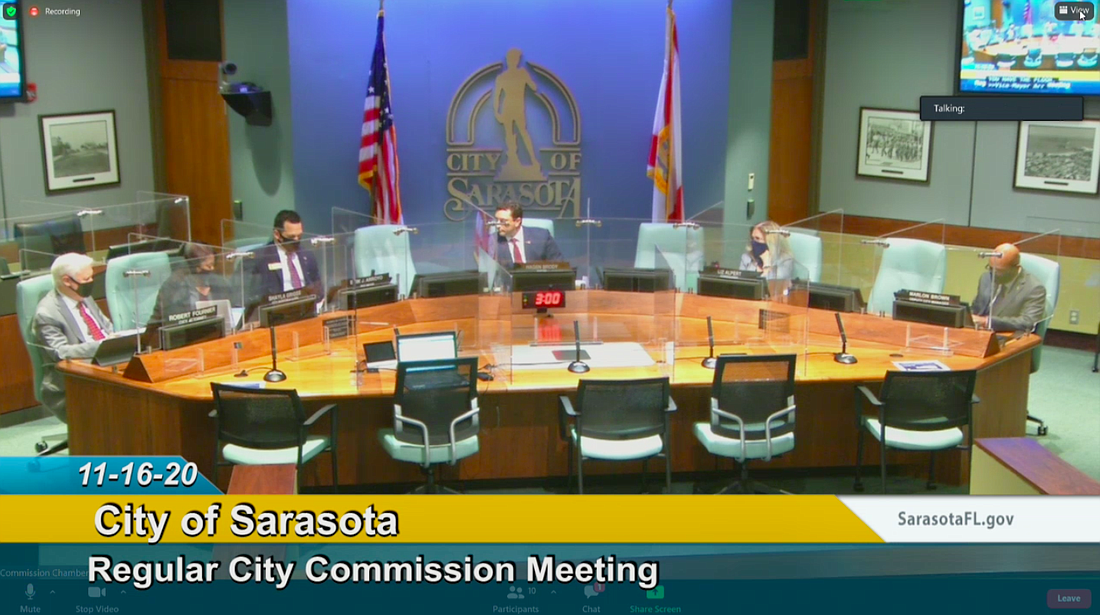- April 19, 2024
-
-
Loading

Loading

The City Commission is discovering that coordinating schedules between five people can be challenging — particularly if you’re also trying to factor in the availability of dozens of staff members and more than 58,000 constituents.
Next month, the board will continue a conversation it began in November about the possibility of changing the start time and frequency of commission meetings. According to a draft document for the Jan. 4 meeting, staff has identified an alternative schedule that could have the board meet in the evenings up to four times a month: the first and third Monday of the month for regular meetings, and the first and third Tuesdays for “major discussion items” as necessary.
In November, the commission directed staff to gather more information before arriving at a decision; elected officials were split during the preliminary discussion.
Commissioner Erik Arroyo, who joined the board in November, placed the subject on the agenda of the commission’s Nov. 16 meeting. Commission meetings are held once every two weeks, consisting of an afternoon session scheduled to run from 1:30-4:30 p.m. and an evening session that begins at 6 p.m.
Arroyo suggested city meetings could be improved if they were held exclusively in the evenings, potentially moving to once-a-week to make up for the shorter runtime. Arroyo said he believes meetings can get bogged down when they run all day.
“I think a process like this would really open us up to have more meaningful discussions and be more efficient as a commission,” Arroyo said.
Mayor Hagen Brody was a vocal advocate for moving commission meetings to the evening. Brody noted that a majority of the commission still works other jobs in addition to their part-time elected duties. He also argued that daytime meetings were an impediment to public participation because the commission’s afternoon session takes place during the traditional workday.
Brody floated multiple theoretical alternatives: weekly Monday meetings, biweekly Monday and Tuesday meetings or biweekly Monday meetings with additional special sessions to address specific agenda items as necessary. He felt strongly that those represented a superior option compared to the current schedule.
“We cannot keep doing these meetings in the middle of the workweek,” Brody said. “It’s not fair to the working people on the commission, and it’s also not fair to the public. My hope is that we can have commission meetings that are in prime time, where people — working people, young people — can pay attention.”
Longer-tenured commissioners noted this isn’t the first time they’ve had this conversation.
In the past, elected officials have expressed concern about the length of commission meetings, which can run past midnight after starting in the afternoon. During discussions dating back to 2017, board members have raised similar arguments in favor of and in opposition to changing the existing schedule. So far, the commission has agreed on one change: bumping back the start time of the afternoon session an hour from 2:30 p.m. to 1:30 p.m.
Commissioner Liz Alpert doesn’t think the commission’s schedule is perfect — she’d prefer meeting on Tuesdays and starting in the morning — but she sees drawbacks to a shift to the evening. She questioned the toll it would take on city staff in attendance at commission meetings, whose workdays begin at 8 a.m. And she said some factors contributing to the bloat of meetings have nothing to do with when the proceedings start.
“If you have 200 people show up for a meeting, you can’t tell them they can’t speak,” Alpert said. “There’s no way to control that. You are going to lose people.”
Commissioner Jen Ahearn-Koch said she understood Arroyo’s and Brody’s perspectives, but she thinks there’s a reason why the commission schedule is laid out the way that it is. In addition to sharing Alpert’s concern about the staff — and potential expenses to the city associated with increased overtime — she said evening meetings could negatively affect commissioners, too.
If the commission had to convene more frequently, board members would have less downtime between meetings. For commissioners with families, especially children, an evening-heavy schedule could be particularly taxing.
“When you can’t go and take your children to soccer practice or music lessons or ballet or have your family dinner, that is going to really break into people’s personal life,” Ahearn-Koch said.
As the only board member not to take an initial stance on the question of meeting times, Commissioner Kyle Scott Battie positioned himself as a potential swing vote.
Battie said he felt the prospect of evening meetings warranted investigation, but he said he understood the perspective of those on each side. He said he empathized with working commissioners, but after taking office in November, he didn’t have a strong opinion on what schedule would work best.
“We just have to figure out what works best for the commission and the citizens as well,” Battie said.
The commission directed staff to gather more information about potential alternative meeting schedules, including the implications for city employees and the logistics of putting together meeting agendas.
The full agenda for the Jan. 4 meeting is not yet published, but a draft document indicates staff is presenting a possible evening schedule built around biweekly sessions on Mondays for routine items, with higher-profile topics set aside for Tuesdays as needed.
The commission is tentatively scheduled to resume its deliberation during the afternoon session of the Jan. 4 meeting.